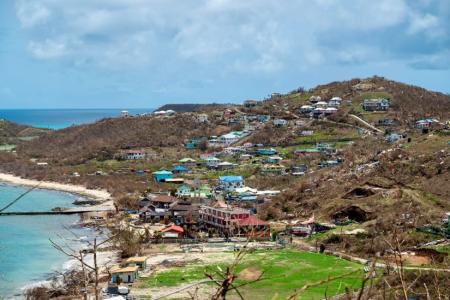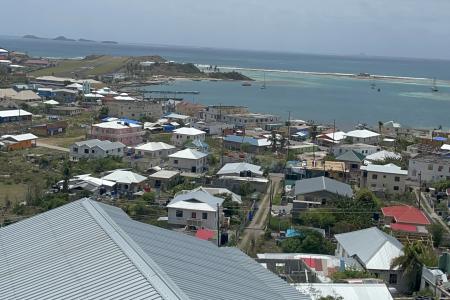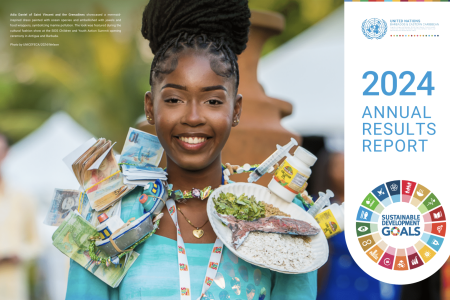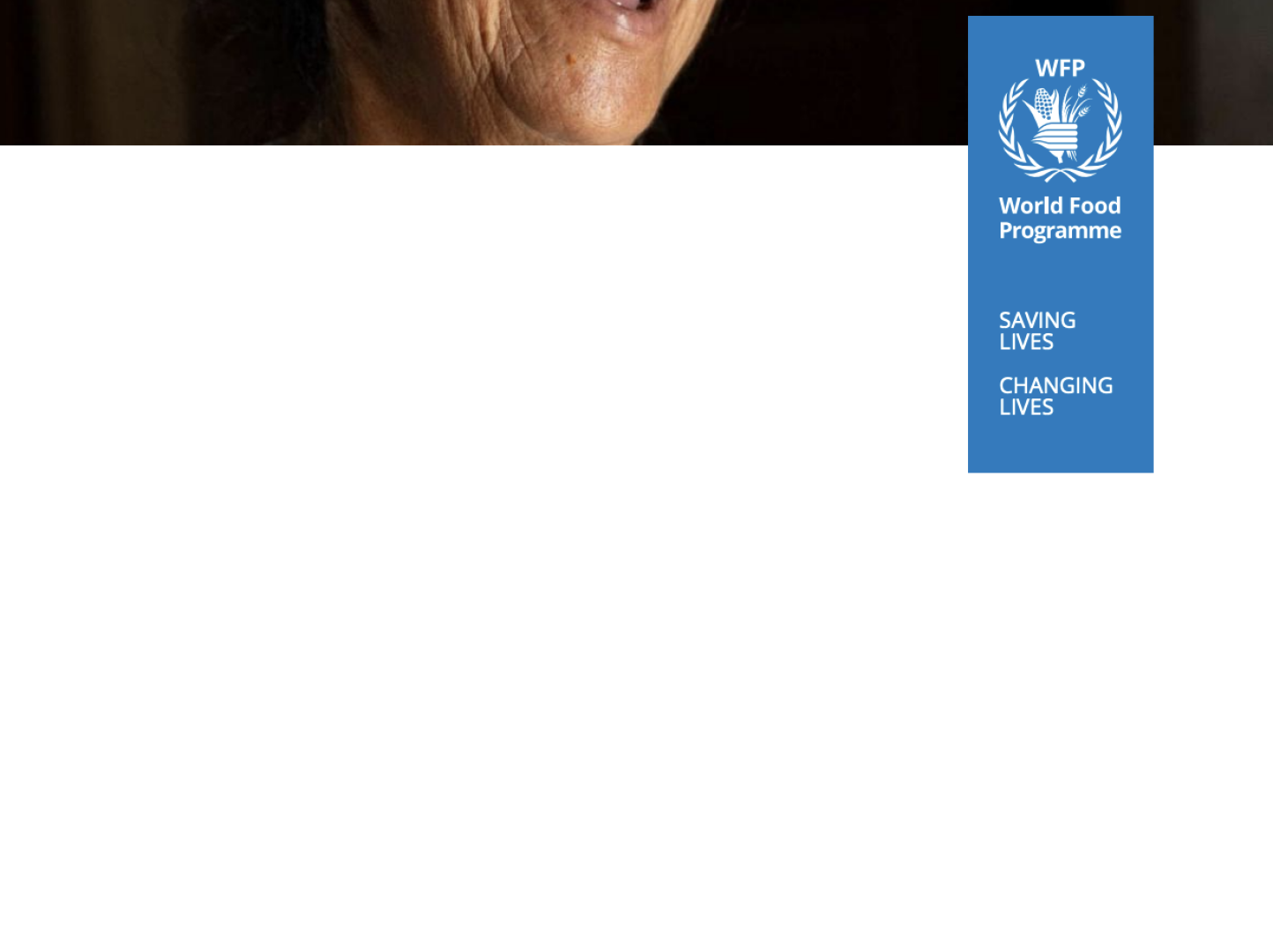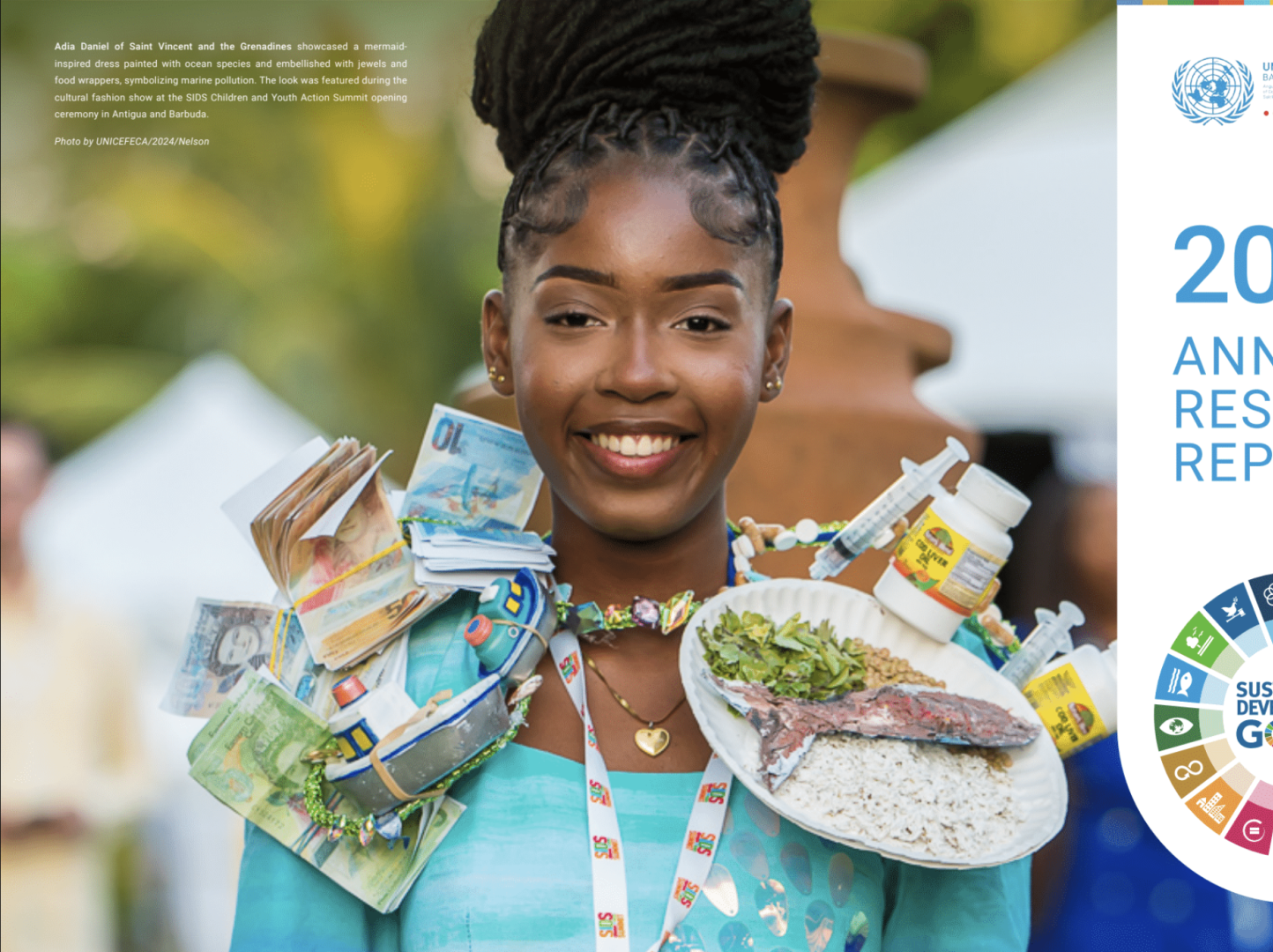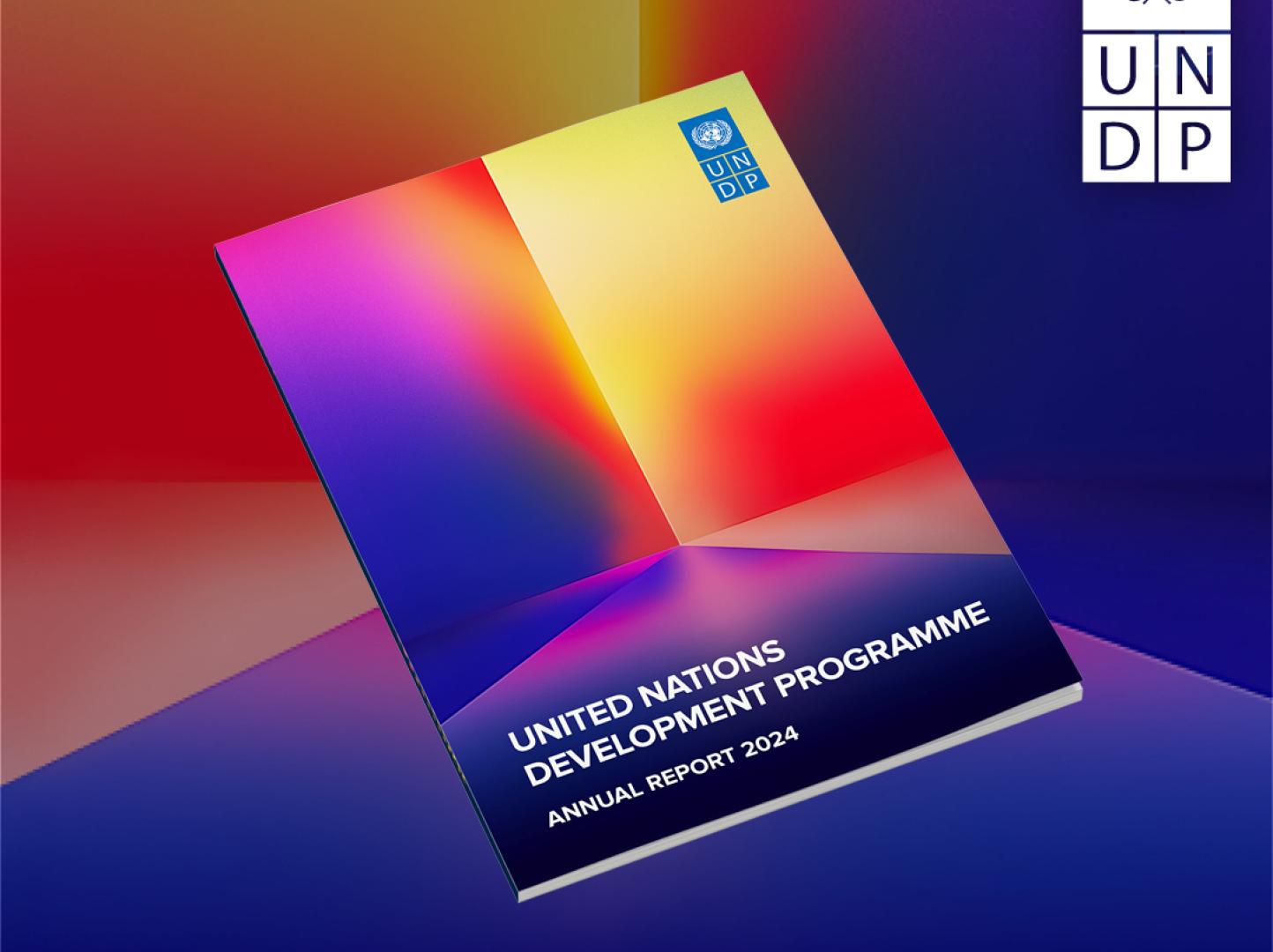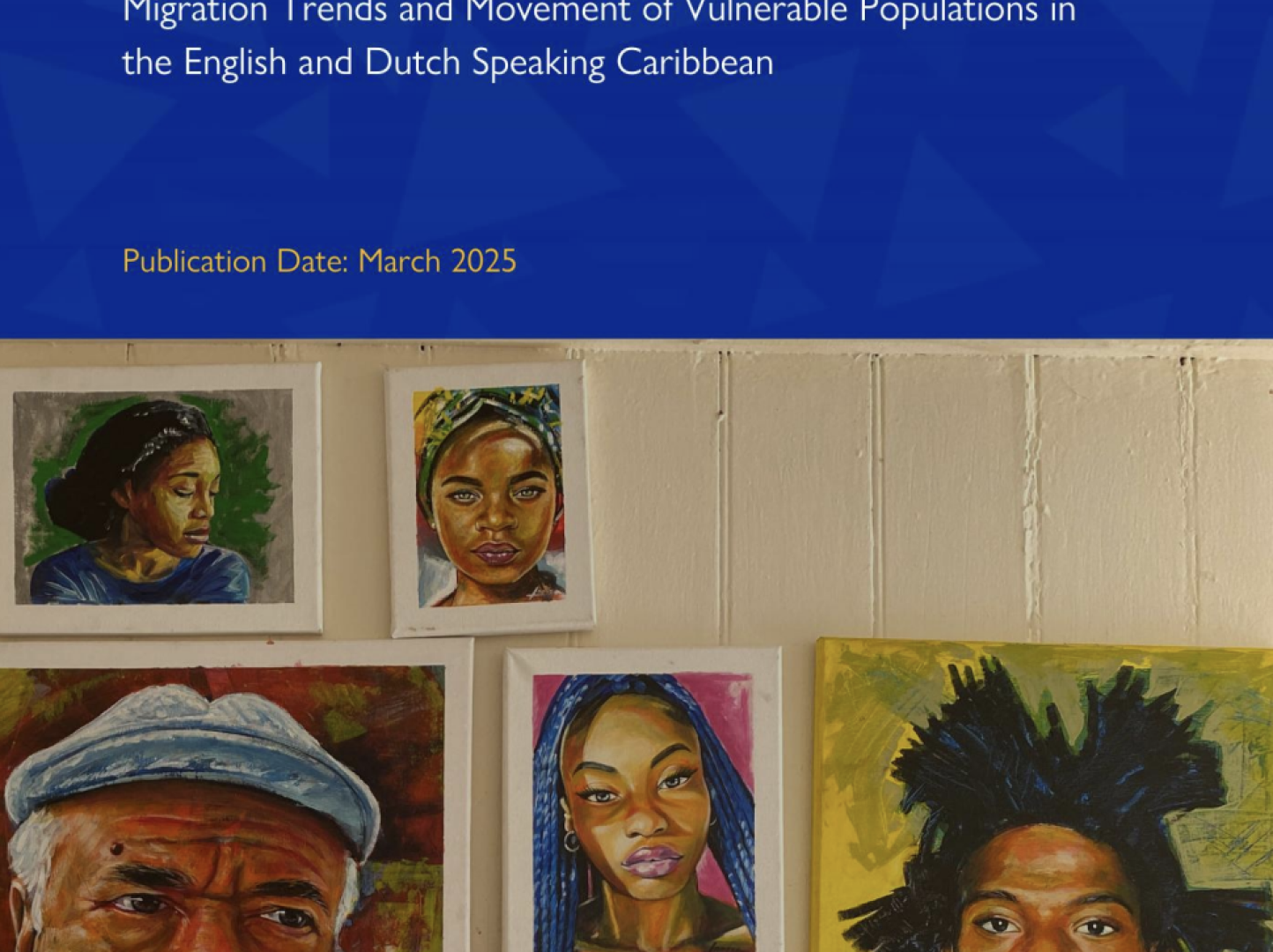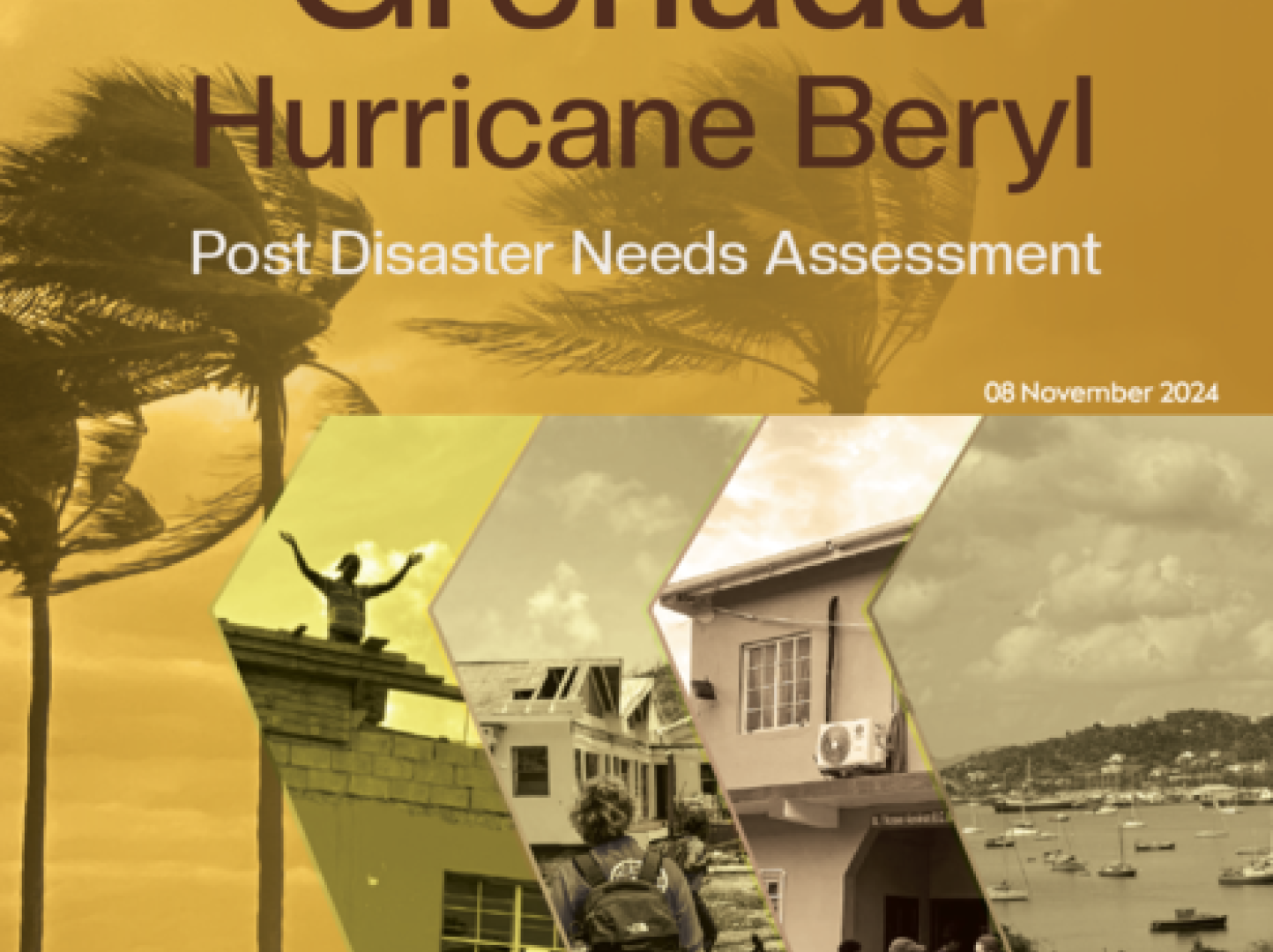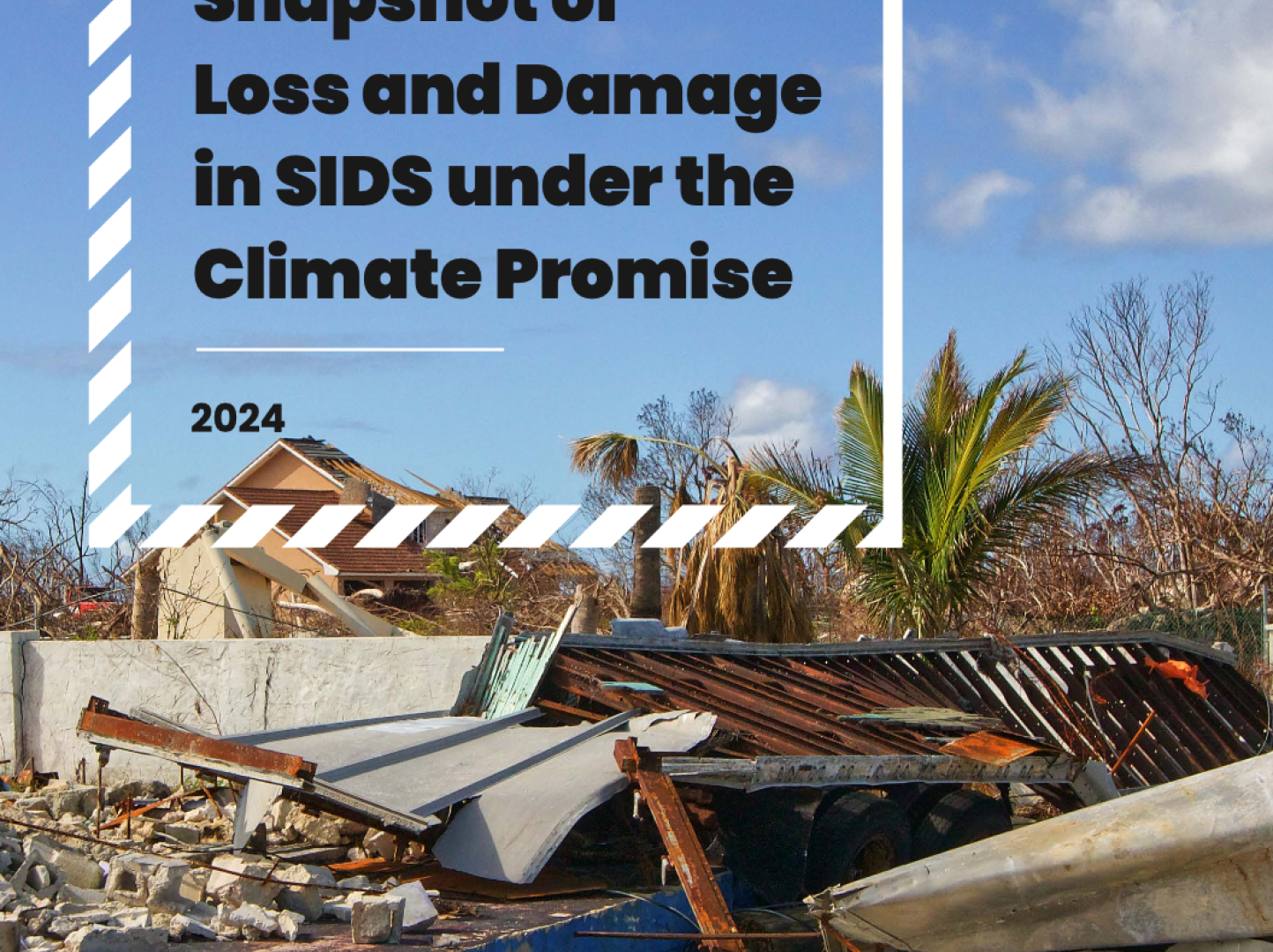Latest
Story
07 July 2025
One Year After Beryl: Stories of Recovery, Resilience, and Rebuilding Lives
Learn more
Story
07 July 2025
One Year After Hurricane Beryl: A Journey of Survival and Recovery in the Southern Grenadines
Learn more
Press Release
02 July 2025
Caribbean Airports Boost Disaster Readiness Ahead of Hurricane Season
Learn more
Latest
The Sustainable Development Goals in Barbados and the Eastern Caribbean
The United Nations Barbados and the Eastern Caribbean in collaboration with its partners is supporting implementation of the sustainable development goals across the 10 countries covered by our multi-country office (MCO). These 17 Global Goals are a roadmap to address the most pressing challenges facing Caribbean citizens and persons all over the world, to create a sustainable future for all.
Kindly note that the data visualizations show an aggregate of the Caribbean. To view the disaggregated data per country, please click on the name of the country or territory you wish to explore.
Publication
06 March 2025
Hurricane Beryl Post Disaster Needs Assessment (PDNA) - Grenada
This Post-Disaster Needs Assessment (PDNA) report presents the background, context, effects, impact, recovery needs and recovery strategy following the impact of Hurricane Beryl in the tri-island State of Grenada, Carriacou and Petite Martinique. The Government of Grenada requested assistance from the UN Development System, the World Bank and the European Union to conduct a post disaster needs assessment. The multi-donor approach was agreed to as the most suitable approach to avoid duplication of efforts. The report was prepared under the leadership of the Ministry of Economic Development, Planning, Agriculture and Lands, Forestry, Marine Resources and Cooperatives through its Economic Development, Planning and Cooperatives Permanent Secretariat. This PDNA was supported by the Caribbean Disaster Emergency Management Agency (CDEMA), United Nations Agencies (UNRCO, ECLAC, FAO, PAHO, UNDRR, UNESCO, UNICEF, UN Women, UNDP, WFP) and the European Union, with facilitation by the United Nations Development Programme (UNDP). It also benefited from the valuable inputs of bilateral and multilateral partners, such as the World Bank, Caribbean Development Bank (CDB), and the Caribbean Catastrophe Recovery Insurance Facility (CCRIF). It is anticipated that the findings of the PDNA and the specific strategic interventions proposed therein will be utilized as the main blueprint for developing a detailed recovery programme for the country, as well as an instrument for facilitating access to technical and financial resources for the reconstruction and rehabilitation efforts over the short, medium to long term.
1 of 5
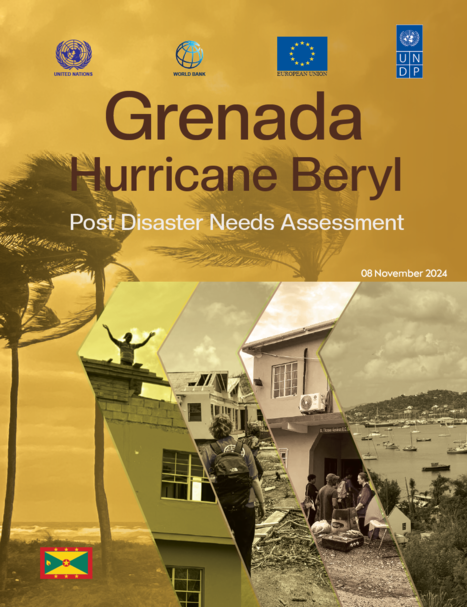
Publication
10 March 2025
Women’s rights in review 30 years after Beijing
In 2025, the world celebrates 30 years of achievement on the Beijing Declaration and Platform for Action, a visionary 1995 plan agreed by 189 governments to achieve the equal rights of all women and girls.The UN Secretary-General’s report on the 30-year review and appraisal of the Beijing Declaration and Platform for Action reflects global, regional, and national reviews of 159 countries, summarizing progress and priorities for further action. It finds that many countries have made strides on gender equality and women’s empowerment, from banning discrimination in employment to adopting gender-responsive climate action plans. Innovation is accelerating progress, and opportunities are opening to scale up proven strategies. Yet gender discrimination remains deeply embedded in all economies and societies, imposing chronic constraints on the rights and hopes of women and girls.Extensive participation in the review reflects the continued relevance and critical importance of the Beijing Platform for Action, including in reaching the global Sustainable Development Goals. Based on the findings, UN Women has collaborated with partners to design the “Beijing+30 action agenda”, which brings people together to realize the promises of the platform and the global goals, reinforcing how everyone has a role to play.This summary report highlights findings from the UN Secretary-General’s report.
1 of 5
Story
20 February 2025
Guterres declares ‘trouble in paradise’ in support appeal for the Caribbean
"The exquisite beauty of the Caribbean is famed the world over. But there is trouble in paradise."United Nations Secretary-General António Guterres sounded the alarm in his address to Caribbean leaders gathered at the opening ceremony of the 48th Regular Meeting of the Conference of Heads of Government of CARICOM on 19 February 2025 in Barbados.From the ongoing socioeconomic impact of the COVID-19 pandemic, to soaring debt and escalating extreme weather events, Guterres described a region beset by crises beyond its control and called for international solutions.Against the backdrop of these compounding challenges, the CARICOM Summit is taking place at the Lloyd Erskine Sandiford Centre in Bridgetown under the theme ‘Strength in Unity: Forging Caribbean Resilience, Inclusive Growth and Sustainable Development’. Heads of State and Government are expected to address a range of issues, including food security, climate change, reparations for historical injustices and regional integration through the CARICOM Single Market and Economy (CSME).In his address, Guterres outlined three key areas where a unified Caribbean is crucial for progress:Unity for Peace and SecurityGuterres emphasised the urgent need to address the crisis in Haiti, where gang rule has inflicted immense suffering on the population. He said that he would soon report to the United Nations Security Council on the situation in Haiti, including proposals on the role the UN can play to support stability and security and address the root causes of the crisis. "It is my intention to present to the Security Council a proposal that is very similar to the one that we have presented for Somalia in which the UN assumes the responsibility of the structural and logistical expenditures that are necessary to put a force in place and the salaries of the force are paid through the trust fund that already exists. And if the Security Council will accept this proposal, we’ll have the conditions to finally have an effective force to defeat the gangs in Haiti and create the conditions for democracy to thrive."He commended CARICOM's support and reiterated his call for a “political process – owned and led by the Haitians – that restores democratic institutions through elections.”The Secretary-General also urged regional leaders to continue tackling the "weapons and drug trafficking that is fuelling violence across the Caribbean", even while appealing to "countries of origin and countries of destination" for stronger cooperation in waging this battle. Unity for Climate ActionAcknowledging the disproportionate impact of climate change on the Caribbean, Guterres stated, "You face a deplorable injustice: A crisis you have done next to nothing to create is wrecking economies, ruining lives, and threatening your very existence." He called for renewed commitment to limiting global temperature rise to 1.5 degrees Celsius above pre-industrial levels and urged G20 countries to lead in the delivery of ambitious climate action plans. All member States adhering to the Paris Agreement are required to submit new Nationally Determined Contributions (NDCs) in 2025, aimed at mitigating and adapting to climate change. Guterres also stressed the need for increased climate finance, adaptation measures, and meaningful contributions to the Loss and Damage Fund."You must be able to find new innovative sources of financing and namely to finally put serious a price on carbon.Unity for Sustainable DevelopmentGuterres emphasised the global challenges in financing the Sustainable Development Goals (SDGs), noting that debt servicing consumes funds while international financial institutions remain underpowered. He praised Caribbean countries for their leadership in pushing for change, stating, "Caribbean countries have been at the forefront of the fight for change – pioneering bold and creative solutions."The Secretary-General highlighted the progress marked by the Pact for the Future, which commits to advancing an SDG Stimulus of $500 billion a year. He noted that the Pact calls for considering structural vulnerabilities in access to concessional funds, including through the Multidimensional Vulnerability Index (MVI). Additionally, it calls for representation in international financial institutions to "correct for the world's vast inequalities and injustices," and for effective action on debt.Guterres urged the implementation of these commitments and emphasized the importance of ensuring all countries can benefit from sustainable development technologies by delivering on the Global Digital Compact.The Secretary-General concluded his address by acknowledging the power of Caribbean unity. "A unified Caribbean is an unstoppable force. I urge you to keep using that power to push the world to deliver on its promise." — UN Secretary-General António GuterresThis story was first published by UNIC
1 of 5
Publication
08 January 2025
2023 Development Partners Landscape Assessment for the Eastern Caribbean
This report is a comprehensive effort to map, analyze, and contextualize the contributions of development partners to the Eastern Caribbean. It provides insights into funding trends, emerging priorities, and areas of strategic alignment. By examining the diverse range of actors, from bilateral and multilateral agencies, this report highlights the evolving dynamics of development financing in the Eastern Caribbean.Moreover, the report provides a basis for increased strategic cooperation and coordination amongst governments in the sub-region and development partners through open and intentional sharing of information on current project portfolios and future needs.
1 of 5
Publication
01 December 2024
Grenada Economic Costs of Violence Study 2023
Violence Against Women and Girls (VAWG) has economic costs for individuals (e.g., victims and their children), families, communities and society at-large. Several countries have estimated the costs of VAWG, in an effort to understand the economic impacts of VAWG on the national economy and to determine investments needed to lessen, if not eliminate VAWG.The direct costs of VAWG include costs that impact the health, police, justice and social welfare systems, as well as costs of victim support services (e.g., shelters, counselling, legal aid). There are also indirect costs related to VAWG, such as: lost employment, wages and productivity; learning time lost; and harm to VAWG survivors and their children. Ultimately, VAWG has negative effects on the lives of women and their children, which undermines poverty reduction measures.Estimating the economic costs of VAWG enables governments to understand the importance of enacting legislation, policies, action plans and programmes aimed at ending VAWG, and allocating an appropriate budget to support effective implementation of such initiatives and provision of quality essential services to VAWG survivors and their children. Estimating the economic costs of VAWG provides a basis for evidence-based decision- and policy-making, and programme development.This VAWG costing study was one of three costing studies conducted in the Caribbean.
1 of 5
Story
07 July 2025
One Year After Hurricane Beryl: A Journey of Survival and Recovery in the Southern Grenadines
St. Vincent and the Grenadines - On July 1st, communities across St. Vincent and the Grenadines, particularly in the Southern Grenadines, marked one year since Hurricane Beryl made landfall, unleashing catastrophic winds and widespread destruction. While rebuilding continues in the Southern Grenadines, the hardest-hit area, the past year has served to reveal the strength, solidarity, and resilience of its people.“We Survived by Standing Together” “When the winds came, I went into survival mode,” recalled Brad Phillips, a resident of Canouan, as he stared into the distance. Brad described how he sheltered with and protected his elderly parent as their roof was torn off. Cut off from communication and without electricity, in the aftermath, Brad and other impacted residents focused on immediate survival, finding shelter, caring for neighbors, and preserving what little remained.“We lost so much,” he said, “but we stood together. That’s what kept us going.”Coordinated UN Response from Day OneFrom the earliest days of the emergency, the United Nations (UN) working through its Resident Coordinator’s Office (RCO) for the Barbados and the Eastern Caribbean and the Office for the Coordination of Humanitarian Affairs (OCHA) played a role in supporting the nationally led response in close collaboration with Caribbean Disaster Emergency Management Agency (CDEMA) and other regional and international partners.Together with government and civil society partners, UN agencies including WFP, IOM, UNICEF, UNDP, UNFPA, FAO, PAHO and UN Women mobilized to provide immediate humanitarian relief and long-term recovery support:Emergency food assistance, clean water, and hygiene supplies reached hundreds of affected households.Roofing materials, debris removal, and housing assessments helping families begin to rebuild.Community resilience was strengthened through clean-up campaigns, backyard gardening initiatives for food security, and technical guidance for safer, more resilient housing.Rebuilding Lives and HomesAccording to local officials, 70% of damaged roofs have now been repaired, many with UN-backed material assistance. However, the complete reconstruction of homes remains a challenge, especially for renters and vulnerable groups. Supply chain delays, transportation costs to the Southern Grenadines, and limited contractor availability have slowed progress.In response, many families have adopted a “self-help” approach, rebuilding using UN-supplied materials and community support networks to fill the gaps.Protecting the Island’s Fragile EcosystemBeyond homes and infrastructure, Union Island’s natural environment took a hard hit.“It looked like no trees had survived,” shared a local environmental advocate. “Beaches lost huge amounts of sand, and some of what’s left is being removed for construction, which could worsen erosion”. UN partners supported environmental recovery efforts, including assessments, debris clearance, small-scale reforestation, and technical support for trail and biodiversity restoration. Additional resources are urgently needed to expand these efforts and strengthen resilience against future hazards.Looking Ahead: Building Resilience TogetherWith a new hurricane season underway, residents feel better prepared mentally and practically. The UN Team in Barbados and the Eastern Caribbean also stands ready to support in “Survival, that’s what matters most,” notes one islander.The UN and partners continue to support government plans to expand resilient housing, strengthen disaster preparedness, and integrate environmental recovery into response strategies. Community leaders stress the need for ongoing collaboration to ensure no one is left behind.A Call to ActionThe Southern Grenadines' story is one of determination, community spirit, and the impact of collective action. One year after Hurricane Beryl, it serves as a reminder that while disasters can be devastating, recovery is possible, with the right partnerships, resources, and commitment. The community and the UN together call for continued support to build resilient homes, restore ecosystems, and protect lives and livelihoods.
1 of 5
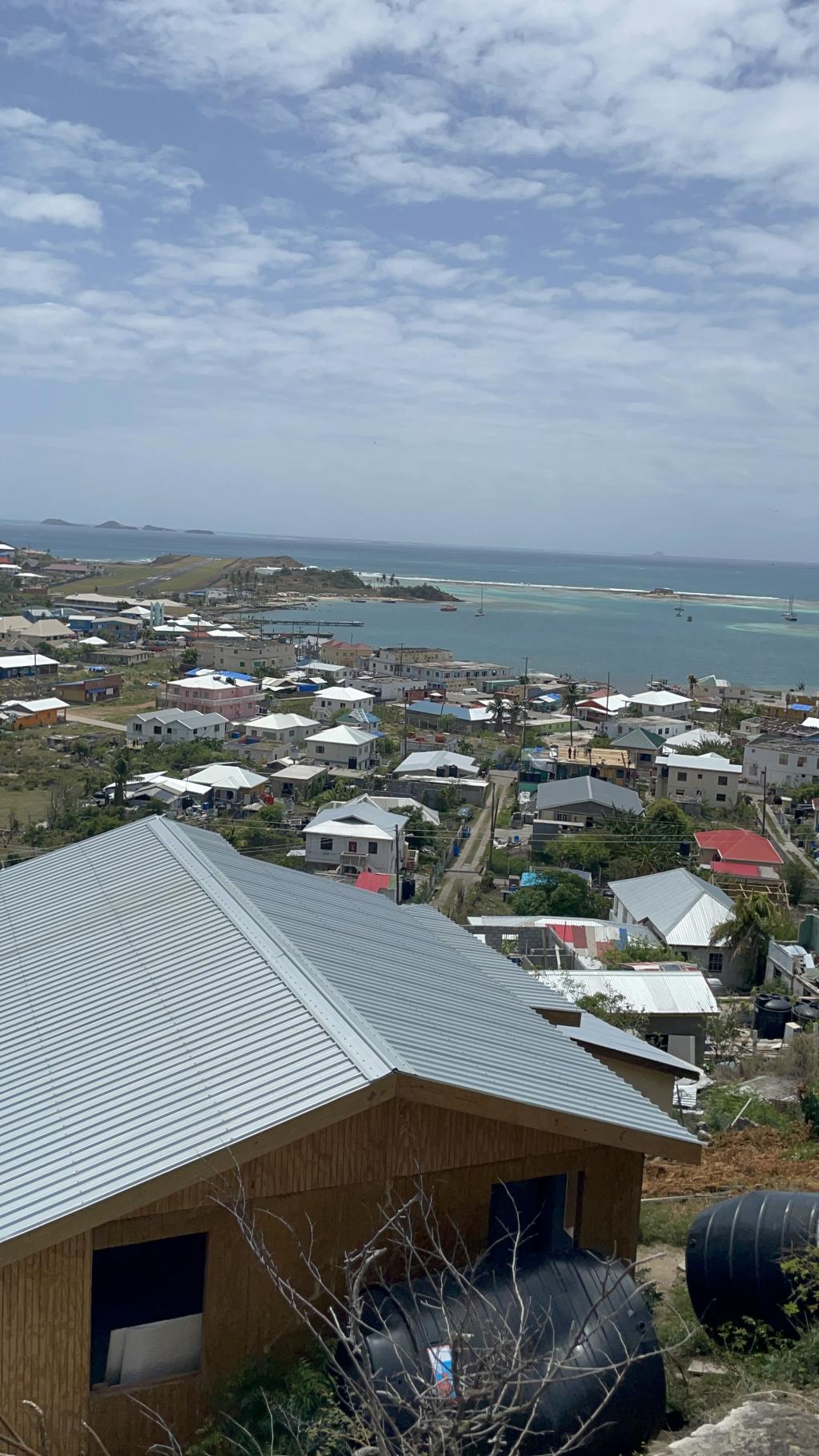
Story
07 July 2025
One Year After Beryl: Stories of Recovery, Resilience, and Rebuilding Lives
When Hurricane Beryl tore through the Caribbean in July 2024, it left behind a trail of destruction that changed lives overnight. Homes were flattened, roads washed away, and communities disconnected from the rest of the world. But perhaps even more devastating than the physical destruction was the emotional weight that settled in its wake especially for families who lost not only their shelter but their sense of safety. For Jady Forde, a mother in Saint Vincent and the Grenadines, the hurricane turned her familiar neighbourhood into something unrecognizable. “It looked like a strange place,” she recalls. Yet amid the destruction, there was a spark of hope: a food kit from the World Food Programme (WFP). Inside were basic items macaroni, canned fish, rice. Enough to cook her family’s first meal since the storm. “The kitchen had flooded, and our feet were sore and wrinkled from standing in the water,” she said, describing how she waded through to prepare dinner. “But we were happy. We were eating together againWithin days of the storm, WFP had mobilized 5,000 food kits for the hardest-hit families, with support from the Central Emergency Response Fund (CERF) and in partnership with CDEMA and national authorities. Temporary storage units were set up on Union Island, Saint Vincent, and Carriacou to safely store and distribute food and other relief items. These mobile logistics hubs provided a lifeline during the most critical moments.But recovery was never only about supplies, it was also about healing.In Carriacou, Grenada, the trauma ran deep, particularly for women and girls. The Ministry of Carriacou & Petite Martinique Affairs, with support from UN Women, launched the Safe Space Initiative to respond to the emotional aftermath. Designed for women and girls between the ages of 7 and 17, and 18 and older, the programme offered something invaluable: a safe place to talk, to cry, to create, and to begin to heal. “We needed a space for our girls and women to process what they were going through. By providing a supportive and secure environment, we aimed to empower them to help them feel seen again," explained Nadina Williams, Programme Manager at the Ministry.Over three months, the Safe Space Initiative hosted support circles, trauma recovery workshops, and information sessions on sexual and reproductive health, housing services, and Gender-based Violence (GBV) support. These sessions did not just meet immediate needs; they opened doors to longer-term empowerment.The experience also underscored a critical lesson: response efforts must include systems that protect women and girls, even during the chaos of a disaster. That’s why, with support from UN Women and the United Nations Population Fund, Grenada has since accelerated the development of a shock-responsive GBV referral pathway. The goal is clear: no woman or girl should be left without protection or support when the next tropical storm or hurricane comes.One year later - the debris has mostly cleared, but the journey to recovery continues. Across Saint Vincent and the Grenadines, Grenada, and other affected islands, families like Jady’s are slowly rebuilding their lives brick by brick, meal by meal, conversation by conversation.Their stories are reminders that in every hurricane or extreme weather event to hit the Caribbean, there are quiet acts of resilience. That behind every food kit, every support circle, every logistics hub, are people, mothers, daughters, and neighbours, finding strength in the midst of loss.As we hit one year post Beryl and the 2025 hurricane season begins, the region stands better prepared, but true preparedness lies in the spirit of our people.Throughout the response, the UN Resident Coordinator served as the lead representative of the United Nations, advocating for international support, mobilizing emergency funding, and ensuring that recovery efforts remained people-centered and inclusive. Collaboration between the United Nations Office for the Coordination of Humanitarian Affairs (OCHA) and the Caribbean Disaster Management Agency (CDEMA) has been essential in supporting humanitarian coordination and preparedness across the Caribbean. This partnership has played a pivotal role in linking regional and international mechanisms to address local needs, particularly in complex multi-island settings such as Saint Vincent and the Grenadines and Grenada.
1 of 5
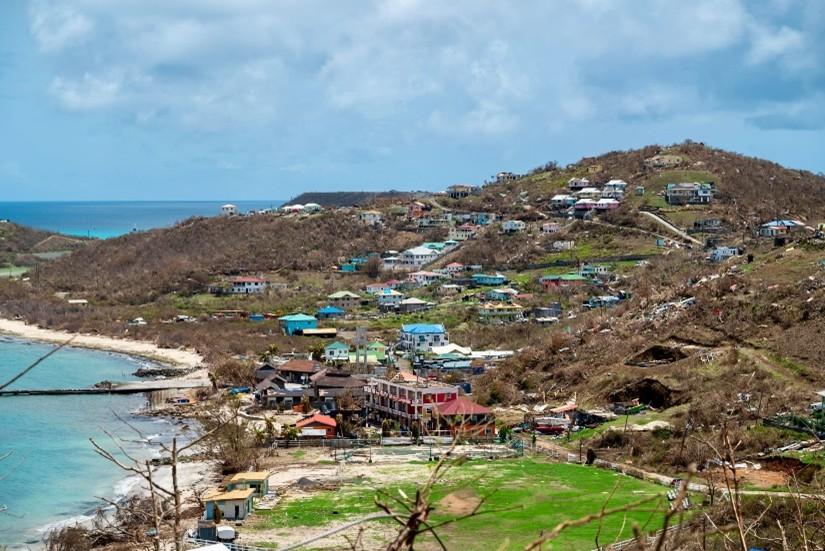
Story
07 June 2025
UN Hosts Private Sector Engagement in Antigua and Barbuda
Over 30 private sector companies in Antigua and Barbuda recently joined with Government representatives, United Nations officials, and other development partners , for a Private Sector Engagement under the theme: “Private Sector Partnership for Sustainable Development”.The June 3 UN-led forum, focused on the Sustainable Development Gals (SDGs) , with vital knowledge exchange between UN Agencies , Funds and Programmes, and local businesses, to enable integrated support for sustainable business practices and SDG funding and financing. Private Sector companies also learnt about the benefits of corporate sustainability and gained greater insight into opportunities for aligning the SDGs into their business models.In delivering remarks, UN Resident Coordinator for Barbados and the Eastern Caribbean, Mr. Simon Springett, while noting challenges facing the sector, emphasized the potential for aligning business operations with the SDGs both in terms of unlocking private capital, and providing socially responsible solutions that translated into real-world benefits.“Sustainability opens doors to new sources of capital. Each year, over $1 billion in climate and SDG-aligned financing is available to the Caribbean, primarily for businesses that align with sustainability principles. Consumer preferences are also shifting. Globally, 73% of travelers now seek eco-friendly accommodation, and international buyers increasingly favor sustainable, ethically produced goods. For the Caribbean, embedding these values into our value chains is essential to boosting export competitiveness and accelerating tourism recovery,” he stated.Senator Dwayne George, in his remarks, acknowledged the Government’s awareness of the challenges faced by the private sector, providing assurance that deliberate steps are being taken to address these challenges. He noted: “In recent times, the Government of Antigua and Barbuda has advanced several proactive measures to deepen public-private collaboration, particularly through innovative partnership models.” Senator George cited the promotion of innovative Public-Private Partnerships (PPPs), strengthening of institutional mechanisms and improving access to finance, as among the key initiatives being undertaken.Immediately following the opening remarks, presentations were made by several participating UN Agencies, private sector companies, as well as from the UN Caribbean Global Compact Network. Participants also had ample opportunities to interact during the networking segment, learning more about available tools and resources, as well as opportunities for further dialogue and collaboration, to foster sustainable business practices in Antigua and Barbuda and the Eastern Caribbean.Ms. Joy-Marie King, Director of International Trade and SDG Focal Point in the Ministry of Foreign Affairs, in her presentation, outlined the role of the private sector in sustainable development and encouraged businesses to adopt sustainable business practices and work collaboratively with the government and development partners towards the achievement of the SDGs.In her closing remarks, Mrs. Andrea Andrew, UN Country Coordination Officer , underlined that sustainable partnership was at the heart of development. She encouraged participants to keep the momentum going , and to let engagement be the first step towards a strong and collaborative partnership between the UN and the Private Sector. ---Ends--- Media Contacts: Andrea AndrewUN Country Coordination Officer - Antigua and BarbudaUnited Nations Resident Coordinator’s OfficeEmail: andrea.andrew@un.org; Telephone: +1 (268) 720-6192; Mobile: + 1(268)464-5350
1 of 5
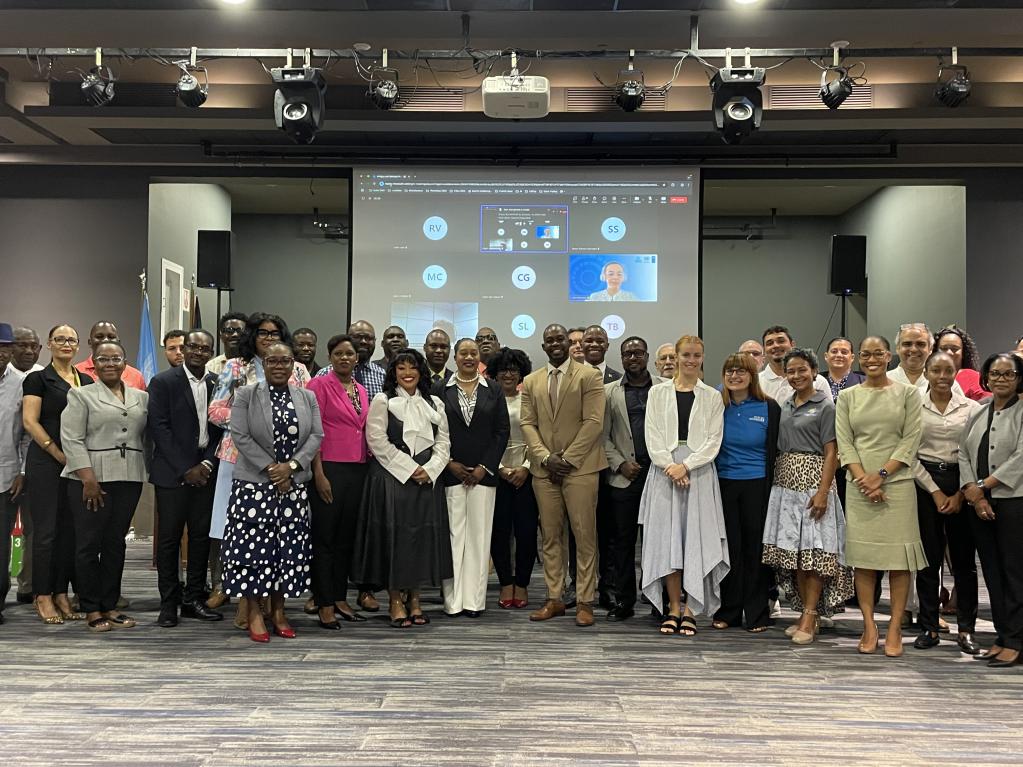
Story
05 June 2025
Sixteen Agri-Businesses Receive Grants to Boost Sustainable Agriculture in St. Vincent and the Grenadines
Kingstown, St. Vincent and the Grenadines – Sixteen agri-businesses in St. Vincent and the Grenadines have been awarded microgrants under the Global Environment Fund (GEF) Agricultural Micro-Enterprise Post-Production (AMEPP) Small Grants Programme – an important step towards advancing sustainable agriculture and environmental resilience. Funded by GEF and executed in strategic partnership with the United Nations Development Programme's (UNDP) Ridge to Reef Project and the Ministry of Agriculture, Forestry, Fisheries, Rural Transformation, Industry and Labour of St. Vincent and the Grenadines — this initiative is designed to enhance biodiversity, strengthen ecosystem services, and promote sustainable agricultural land management practices.With a targeted focus on addressing the impact of unsustainable land use and fisheries practices, the AMEPP programme is set to drive measurable environmental benefits while simultaneously stimulating economic growth. The selected grantees will implement projects aimed at business expansion, income generation, employment creation, and improved livelihood resilience — critical components in fortifying the nation's agricultural sector against climate challenges.There was very robust interest in accessing the microgrants, with over 200 agri-businesses making submissions. Ultimately, 16 applicants successfully met the rigorous evaluation criteria and were selected to receive the grant funding. The chosen projects were assessed based on their potential to spark new business opportunities, particularly for women and youth, create employment, generate sustainable revenue, reduce environmental footprints, and leverage co-financing from key partners.The 16 Awardees leading the charge for sustainable agriculture:
1. Madeira Valley Heritage Forest Park
2. Innovative Food Alliance
3. Gifted Hands Agri and Consulting
4. Bequia Culinary Mushroom Farm
5. CHEF MicroFarm
6. Vincy Teas and Gluten-free Flours
7. Union Food Processing
8. We Are Mayreau
9. SVG Horticultural Society
10. Serenity Dive Inc.
11. Bush Bar
12. Bu-te-ful Plants
13. Topical Dried Novelties
14. Ricardo Primus
15. Jazzy’s All Natural
16. Kae’s FarmAmong the recipients, five are women-led enterprises, underscoring the programme’s commitment to gender equity and community empowerment — both crucial pillars for sustainable development.
1. Madeira Valley Heritage Forest Park
2. Innovative Food Alliance
3. Gifted Hands Agri and Consulting
4. Bequia Culinary Mushroom Farm
5. CHEF MicroFarm
6. Vincy Teas and Gluten-free Flours
7. Union Food Processing
8. We Are Mayreau
9. SVG Horticultural Society
10. Serenity Dive Inc.
11. Bush Bar
12. Bu-te-ful Plants
13. Topical Dried Novelties
14. Ricardo Primus
15. Jazzy’s All Natural
16. Kae’s FarmAmong the recipients, five are women-led enterprises, underscoring the programme’s commitment to gender equity and community empowerment — both crucial pillars for sustainable development.
1 of 5
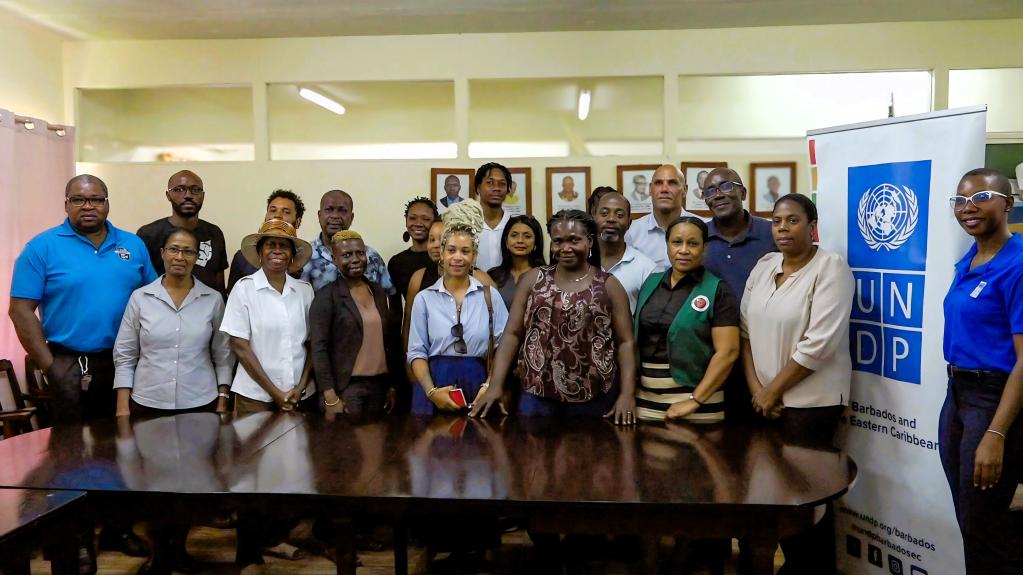
Story
04 June 2025
UN Barbados and Eastern Caribbean Launches 2024 Annual Results Report: Showcasing Collective Action, Resilience and SDG Progress
The 2024 UN Barbados and the Eastern Caribbean Multi-Country Office Annual Report, showcases the collective efforts of the UN Sub-regional Team in partnership with regional Governments, civil society and other development partners, undertaken during the past year. While 2024 was a challenging year, with the impact of Hurricane Beryl, it enhanced collaboration, innovation and partnerships, to amplify the UN’s work and impact across the region, while specifically addressing the needs of the most vulnerable. Progress Despite ChallengesIn a year characterized by various shocks, including natural disasters, the 2024 Annual Report highlights our key achievements in support of Governments’ national priorities and the Sustainable Development Goals (SDGs). Efforts to advance the Global Goals saw significant progress, with private sector companies across the region supporting the UN’s #ACTNOW Campaign. Reflecting on the past year, UN Resident Coordinator, Simon Springett, acknowledged the significant challenges faced by Caribbean SIDS, ranging from economic uncertainty and humanitarian crises to the intensifying impacts of climate change. He, however, noted the remarkable resilience demonstrated by the Governments and people of the region, including in response to Hurricane Beryl. “Yet, through collaboration, innovation, and determination, we have collectively worked towards addressing these challenges, reinforcing the principles of multilateralism and regional and global solidarity.”
Leaving No One BehindIn 2024, the UN Team continued efforts to ensure that the needs of individuals and groups who are most vulnerable and at highest risk of being left behind were prioritized. Through enhanced legislation and advocacy initiatives , including a March for Inclusion in Grenada, Youth Peace Walk in Saint Lucia , and a Red Shoes Project in Barbados, to support survivors of Gender-based Violence, the UN joined with partners and stakeholders to foster inclusive development and to champion the inclusion of vulnerable groups. Efforts also included the advancement of anti-discrimination measures for women, girls, and the LGBTQI+ community. The UN supported the amplification of youth voices in decision-making, and inclusion of persons living with disabilities in its advocacy efforts. Despite the progress made, the Resident Coordinator, emphasized that there was still more work to be done. "As we move forward, we must continue to harness collective will, innovation, and partnerships to bridge gaps in financing for development, scale up climate action, education, healthcare, gender equality, and social protection." Looking Forward with HopeThe 2024 Annual Results Report concludes with a message of hope, underscoring the power of collaboration in overcoming adversity. The UN remains committed to ensuring our collective efforts to promote a sustainable future for all as we advance towards the 2030 Agenda. Download the ReportThe 2024 Annual Results Report is available for download https://bit.ly/UNAnnualReport24
Leaving No One BehindIn 2024, the UN Team continued efforts to ensure that the needs of individuals and groups who are most vulnerable and at highest risk of being left behind were prioritized. Through enhanced legislation and advocacy initiatives , including a March for Inclusion in Grenada, Youth Peace Walk in Saint Lucia , and a Red Shoes Project in Barbados, to support survivors of Gender-based Violence, the UN joined with partners and stakeholders to foster inclusive development and to champion the inclusion of vulnerable groups. Efforts also included the advancement of anti-discrimination measures for women, girls, and the LGBTQI+ community. The UN supported the amplification of youth voices in decision-making, and inclusion of persons living with disabilities in its advocacy efforts. Despite the progress made, the Resident Coordinator, emphasized that there was still more work to be done. "As we move forward, we must continue to harness collective will, innovation, and partnerships to bridge gaps in financing for development, scale up climate action, education, healthcare, gender equality, and social protection." Looking Forward with HopeThe 2024 Annual Results Report concludes with a message of hope, underscoring the power of collaboration in overcoming adversity. The UN remains committed to ensuring our collective efforts to promote a sustainable future for all as we advance towards the 2030 Agenda. Download the ReportThe 2024 Annual Results Report is available for download https://bit.ly/UNAnnualReport24
1 of 5
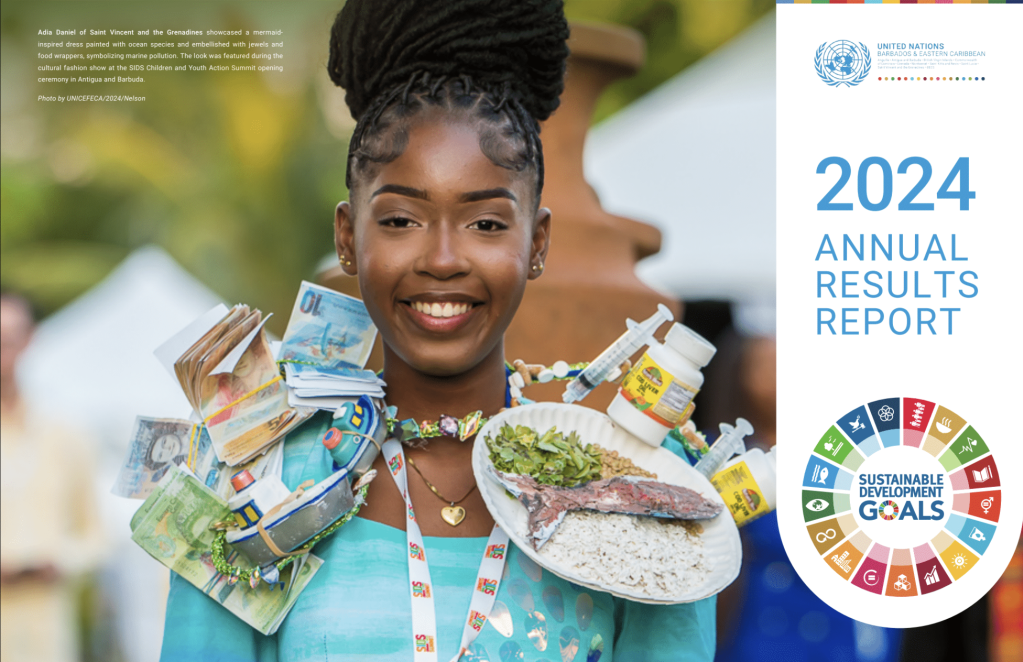
Press Release
02 July 2025
Caribbean Airports Boost Disaster Readiness Ahead of Hurricane Season
Bridgetown, Barbados - The United Nations World Food Programme (WFP), in collaboration with the Caribbean Disaster Emergency Management Agency (CDEMA), Grantley Adams International Airport (GAIA) Inc., DHL, and the European Union, successfully completed the first-ever ‘Get Airports Ready for Disasters’ (GARD) Workshop in the Eastern Caribbean.The workshop, held at the Grantley Adams International Airport in Barbados, marks a significant step in strengthening regional disaster preparedness ahead of the 2025 hurricane season. This crucial three-day initiative brought together 22 participants, including airport authorities, national disaster management agencies, security forces, regional airlines, and disaster response agencies from Barbados, Antigua and Barbuda, and Trinidad and Tobago. The workshop focused on assessing airport infrastructure, coordination mechanisms, and logistical capacities to manage the surge in humanitarian cargo and passengers that typically follows a major disaster.
Brian Bogart, Representative and Country Director for the World Food Programme Caribbean noted: "Airports are critical in emergencies. They often are the epicentre for coordinating supply chain elements of a response. At WFP, we continue to explore additional options to support maximizing the region's capacity and infrastructure for crisis response."
Frank Losada, DHL Go Help Leader USA & Caribbean and one of the lead trainers for the workshop, emphasized the training's importance for the hurricane-prone Caribbean region. "When there is a disaster, like a hurricane or a tsunami, the airport usually becomes a chokepoint," he explained. "It is critical that airports are ready to receive that cargo and ensure aid gets to people in need as fast as possible."
Reflecting on his experiences during events like the La Soufriere volcano eruption and recent hurricanes in the Caribbean, Hadley Bourne, Chief Executive Officer of GAIA Inc., also welcomed the timely training. "This is very integral to national safety and national development. Disaster management and preparedness is nothing to be taken lightly in any form," he maintained.
Meanwhile, speaking on behalf of CDEMA, Kevon Campbell highlighted the indispensable role of partnerships in supporting communities during crises. "We have seen time and again how disasters, pandemics, and other emergencies test the limits of our regional systems," he said, "But we have also seen how preparatory actions, planning, and partnerships—especially those forged in workshops like this—can make a profound difference in saving lives and restoring order."With a prediction for 17 named storms during the 2025 Atlantic Hurricane season, this workshop sought to better position airports, humanitarian organizations, and private sector agencies to collaborate effectively should the need arise. The GARD workshop is one of several joint activities between WFP and CDEMA, who engage in year-round trainings and simulations across the Caribbean to assess and address gaps in disaster preparedness, ensuring people quickly get the help they need when crisis strikes.
WFP remains committed to strengthening regional logistics and supply chain readiness in the face of growing climate threats across the Caribbean.
#########The United Nations World Food Programme is the world’s largest humanitarian organization saving lives in emergencies and using food assistance to build a pathway to peace, stability and prosperity for people recovering from conflict, disasters and the impact of climate change.
For more information please contact: carla.alleyne@wfp.orgFollow WFP on X, formerly Twitter, via @wfp_media @wfp_Caribbean
Brian Bogart, Representative and Country Director for the World Food Programme Caribbean noted: "Airports are critical in emergencies. They often are the epicentre for coordinating supply chain elements of a response. At WFP, we continue to explore additional options to support maximizing the region's capacity and infrastructure for crisis response."
Frank Losada, DHL Go Help Leader USA & Caribbean and one of the lead trainers for the workshop, emphasized the training's importance for the hurricane-prone Caribbean region. "When there is a disaster, like a hurricane or a tsunami, the airport usually becomes a chokepoint," he explained. "It is critical that airports are ready to receive that cargo and ensure aid gets to people in need as fast as possible."
Reflecting on his experiences during events like the La Soufriere volcano eruption and recent hurricanes in the Caribbean, Hadley Bourne, Chief Executive Officer of GAIA Inc., also welcomed the timely training. "This is very integral to national safety and national development. Disaster management and preparedness is nothing to be taken lightly in any form," he maintained.
Meanwhile, speaking on behalf of CDEMA, Kevon Campbell highlighted the indispensable role of partnerships in supporting communities during crises. "We have seen time and again how disasters, pandemics, and other emergencies test the limits of our regional systems," he said, "But we have also seen how preparatory actions, planning, and partnerships—especially those forged in workshops like this—can make a profound difference in saving lives and restoring order."With a prediction for 17 named storms during the 2025 Atlantic Hurricane season, this workshop sought to better position airports, humanitarian organizations, and private sector agencies to collaborate effectively should the need arise. The GARD workshop is one of several joint activities between WFP and CDEMA, who engage in year-round trainings and simulations across the Caribbean to assess and address gaps in disaster preparedness, ensuring people quickly get the help they need when crisis strikes.
WFP remains committed to strengthening regional logistics and supply chain readiness in the face of growing climate threats across the Caribbean.
#########The United Nations World Food Programme is the world’s largest humanitarian organization saving lives in emergencies and using food assistance to build a pathway to peace, stability and prosperity for people recovering from conflict, disasters and the impact of climate change.
For more information please contact: carla.alleyne@wfp.orgFollow WFP on X, formerly Twitter, via @wfp_media @wfp_Caribbean
1 of 5
Press Release
16 April 2025
OHCHR Strengthens Regional Action to Protect Environmental Defenders in Latin America and the Caribbean
Basseterre, Saint Kitts and Nevis (11 April 2025) – From April 7–11, the Office of the United Nations High Commissioner for Human Rights (OHCHR) co-organized with the Economic Commission for Latin America and the Caribbean (ECLAC), the United Nations Environment Programme (UNEP), UN Women, and the United Nations Development Programme (UNDP), the 3rd Forum on Human Rights Defenders in Environmental Matters in Latin America and the Caribbean, under the Escazú Agreement, held in Basseterre, Saint Kitts and Nevis.This landmark event marked the first official regional gathering on the Escazú Agreement in the Caribbean, bringing together nearly 200 participants from 31 nationalities, including environmental human rights defenders, government representatives, civil society organizations, and international experts.As a co-organizer, OHCHR reaffirmed its commitment to promoting and protecting the rights of environmental defenders throughout the region. The Forum advanced the regional understanding and implementation of Article 9 of the Escazú Agreement, which focuses on the protection of environmental human rights defenders.The dynamic discussions led to a wide array of proposals for an upcoming regional assessment on the situation of environmental defenders—spotlighting significant progress while acknowledging ongoing challenges. A key highlight was the integration of a gender perspective, which resulted in clear, actionable recommendations for gender-responsive protection mechanisms.Through workshops prepared and facilitated by OHCHR, participants also strengthened their knowledge and skills in access to justice and digital security, equipping defenders with practical tools to enhance their safety and impact.The exchange of experiences and innovative ideas fostered stronger regional cooperation networks, laying a robust foundation for future action under the Escazú framework.OHCHR’s leadership in this Forum—spearheaded by the Environment and Civic Space Teams from the LAC Regional Strategies Project (ROSA & ROCA) financed by Sweeden, in close coordination with its CARICOM and Mexico offices—was instrumental in achieving these outcomes. This effort reflects OHCHR’s continued dedication to supporting human rights defenders and building resilient civic spaces across Latin America and the Caribbean.
1 of 5
Press Release
11 February 2025
FAO workshop aimed to enhance Grenada's production of premium, high-quality cocoa
St. Georges, Grenada - January 29, 2025 – Grenada, famously known as the “Spice Isle,” is making significant inroads to improve the quality of its “Trinitario” cocoa and cocoa products. This was the main objective behind the five-day training workshop on cocoa agronomy, post-harvest processing, and sensory analysis from January 20-24, 2025, the collaborative effort of The Food and Agriculture Organization of the United Nations (FAO), the Ministry of Agriculture & Lands, Forestry, Marine Resources & Cooperatives of Grenada and the Grenada Cocoa Association. The training was attended by over 40 participants, including farmers, agro-processors, extension officers, agronomists, plant propagators, and chocolate makers and held at Grenada Cocoa Association’s Processing Facility in Mt. Horne in St. Andrew. Led by experts from the Cocoa Research Centre of the University of the West Indies, including Professor Umaharan, Head, Cocoa Research Centre/Professor in Genetics and Dr Sukha, Research Fellow and Food Technologist, the workshop provided comprehensive insights into sustainable practices, quality enhancement, and flavor profiling. The practical sessions focused on key field management practices such as pruning, grafting, soil fertility, managing pest and diseases, as well as understanding the principles driving cocoa fermentation and activities affecting the flavour profile of cocoa beans and chocolate through sensory evaluation, which equipped participants with tools to monitor how production and post-harvest practices influence flavor, ensuring the region’s continued excellence in specialty cocoa. Ms Anne Desrochers, FAO’s Plant Production and Protection Specialist highlighted, “The training was aimed at empowering farmers, agro-processor and other stakeholders to adopt sustainable practices, enhance productivity and promote the awareness of quality through sensory analysis. Through the knowledge gained, I believe the participants are better equipped to further safeguard the legacy of Caribbean cocoa while unlocking its full potential in the high-value specialty cocoa market.” Reflecting on the knowledge gained, Ms Trishia Marrast, Extension Assistant of the Northern Agricultural District stated, “This training was highly educational, emphasizing the importance of understanding and managing witch’s broom disease and mastering grafting techniques. It provided valuable opportunities for extension officers, farmers, and processors involved in the cocoa industry”. Mr Andel Findley, Production Supervisor at Diamond Chocolate Factory added, “The sessions on post-harvest and fermentation methods were particularly beneficial, providing practical insights into cocoa fermentation and the evolution of new techniques. As a chocolate maker, I found the training refreshing, it reinforced past knowledge and introduced new materials, essential for maintaining high-quality cocoa products”. The training also covered key challenges like, mitigation of cadmium in cocoa, pest and disease control, food safety and farm rehabilitation, equipping stakeholders with the tools to boost productivity sustainably and enhance knowledge on industry standards. Of the seven countries designated by the International Cocoa Association as exclusive 100% fine quality cocoa producers, three are from the CARICOM, including Grenada. The current demand on the international market for Caribbean fine flavour cocoa exceeds the available supply. However, through partnerships and collaborative efforts with the Ministry of Agriculture, revitalizing and enhancing cocoa productivity in Grenada can pave the way for sustainable growth, increased production, and quality cocoa products. For more information, please contact:Anne DesrochersPlant Production and Protection SpecialistAnne.Desrochers@fao.org
1 of 5
Press Release
29 January 2025
FAO Training Enhances Post-Harvest Practices in Dominica
18 January 2024 – Dominica, Roseau – The Food and Agriculture Organization of the United Nations (FAO) held its first post-harvest technology and collaborative training session of the year with the Ministry of Agriculture, Fisheries, Blue and Green Economy for extension officials, processors, and farmers on January 15 at the Fisheries Complex in Roseau, Dominica. During the week-long training led by FAO, the group of 25 participants gained thorough understanding of harvest and post-harvest technology and best practices, with an emphasis on lowering product losses, boosting value chain efficiency, and improving crop quality and safety. Dr Mohammed Majeed, Post-Harvest Specialist, drilled down on critical topics such as post-harvest loss quantification, pre-harvest factors affecting shelf life, quality measurement procedures, packaging, cooling, temperature management and transportation. This approach was successful in providing participants with comprehensive insights on methods to increase the yields of high-value vegetables such as tomatoes, sweet peppers, lettuce, broccoli, cauliflower, cabbage, carrots, and cucumbers. Ahead of the customized training, the Ministry of Agriculture sought FAO’s technical assistance to evaluate the feasibility of growing a variety of vegetables, including imported temperate crops, across Dominica’s diverse agroclimatic zones back in 2023. This scoping study considered key factors such as elevation, year-round water availability for irrigation, and the quality and varieties of seeds available. Findings from the study identified specific agroclimatic zones suitable for cultivating specialty vegetable crops which have the potential to reduce imports, increase farmers’ incomes, and create opportunities for export to neighboring countries. In speaking about the success of the training which considered the island's high susceptibility to climate change and scarcity of arable land, among other agricultural issues, Mrs Anne Desrochers, FAO’s Plant Production and Protection Specialist stated, “improved harvest and post-harvest practices are important to improve quality, minimize food waste and achieve food safety. This training will increase local capacities and knowledge within the Ministry of Agriculture as part of the objectives agreed in the current project of the Technical Cooperation Programme to boost high value vegetable crop production”. Grand Fond farmer Mr Marcus Cuffy who attended the training benefited significantly from the information he learnt, especially about cold storage. He expressed, “the session was very informative. I intend to share the knowledge with other farmers and put what I learnt into practice”. Mr Keian Stephenson, Technical Extension Officer with the Ministry of Agriculture and FAO National Correspondent stated that, "the farmers demonstrated a great deal of interest in ways they can reduce harvest loss during the training,". They learnt simple, but practical methods that will increase the amount of produce that reaches the market and put more money in their pockets. On the other hand, exporters and handlers gained knowledge on how to enhance their packaging and minimize losses in their pack houses”. By applying the skills and insights gained from this training, stakeholders in Dominica’s agricultural sector are now better equipped to strengthen local food production, enhance food security, build a sustainable and resilient future. Contact for more information:Ann DesrochersPlant Production and Protection SpecialistAnne.Desrochers@fao.org
1 of 5
Press Release
11 December 2024
Towards a more resilient Caribbean: How EU-CA-RES is Making a Difference
The intervention aims to build a Caribbean that is not only prepared for the challenges of today but ready to face the uncertainties of tomorrow. These challenges and uncertainties include earthquakes, flooding, drought and hurricanes. Recent devastation wrought by Hurricane Beryl in July this year was a stark reminder of the risks the region faces. EU-CA-RES, which was launched in Saint Kitts and Nevis on 2 December, brings together a broad range of partners for maximum reach and influence. The European Union is joined by UNICEF, the World Food Programme (WFP), the UN Development Programme (UNDP), and the UN Office for Disaster Risk Reduction (UNDRR). The initiative will pave the way for a region more able to recover from adversity - such as the ravages of climate change, whether slow and creeping or sudden and catastrophic - with even greater strength and resilience. European Union Ambassador to Barbados and the Eastern Caribbean, Malgorzata Wasilewska declared that while all partners are clearly working towards the same goal, it is imperative that they all work together. “The region has to work closely together, international partners are here to assist,” said Wasilewska. “Every life we help to save, every house we rebuild should always be our motivation to work on these issues.” Enhancing social protection, which provides a safety net for those in need, is critical and EU-CA-RES works to strengthen systems that can provide immediate financial support to families affected by disasters - especially the most vulnerable like women, children, and people with disabilities - who often bear the brunt of these extreme events. Quick access to resources can make a huge difference in helping communities recover. he programme is committed to ‘building back better’ which develops what has gone before. By implementing improved building standards, investing in disaster-proof infrastructure, early warning systems and strengthening institutional policy, planning, financial arrangements, and data gathering and dissemination, the initiative helps to ensure that when the next emergency strikes, the damage will be less severe, with faster recovery processes reducing loss and suffering. Simon Springett, UN Representative for Barbados and the Eastern Caribbean thanked the EU for generously supporting “one United Nation delivering for a collective good.” “We are working collectively every day to reduce that level of fragility and it’s really imperative that we don’t look away, that we really tackle these issues.”
1 of 5
Latest Resources
1 / 11
Resources
11 February 2025
1 / 11

